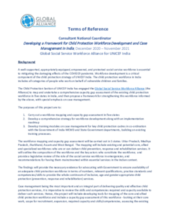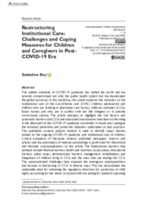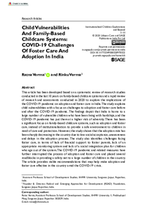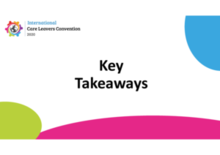childrens_living_arrangement
children_living_without_bio
Displaying 131 - 140 of 427
The Global Social Service Workforce Alliance is seeking a Consultant National Coordinator to contribute as part of the Alliance team to map and undertake a comprehensive capacity gap assessment of the existing child protection workforce in five states in India, and then propose a framework for strengthening this workforce informed by the above, with special emphasis on case management.
This article explores the dynamics of the institutional care of the out-of-home care (OHC) children, adolescents and children who are residing in alternative care homes, childcare institutes (CCIs), foster homes and who are in conflict with law like refugees or in juvenile correctional centres.
According to this article from the Hindu, 24 children have been adopted this year in the district of Kochi in Kerala, India as of November 2020, equal to the total number of adoptions last year.
This article has been developed based on a systematic review of research studies conducted in the last 10 years on family-based childcare systems and a rapid review of research and assessments conducted in 2020 to explore the implications of the COVID-19 pandemic on adoption and foster care in India.
These Practitioner Guidance Papers share the approaches of five Family for Every Child members in adapting existing helplines or setting up new ones during the COVID-19 pandemic
"The Supreme Court [of India] on Tuesday directed for repatriation of children lodged in Children Protection Homes in eight states back to their families to take place as per provisions of the Juvenile Justice Act," says this article from LiveLaw.
According to this article from the Times of India, the NGO Childline has reported that the number of cases of violence against children in the district of Coimbatore in Tamil Nadu, India have gone up, which advocates attribute to the lockdown measures put in place to reduce the spread of the Coronavirus.
The International Care Leavers Convention brought together Care Leavers at an international level to amplify the voices of children and young people and provide them with a platform to learn, share and exchange experiences, knowledge and challenges. This document highlights some key takeaways from the event.
Ten children who were allegedly taken to Kerala, India with the promise of better care and education have been repatriated to their home states, according to this article from the Deccan Herald.
The objective of this Convention is to bring Care Leavers together and provide them with a platform to emerge to learn, share and exchange experiences, knowledge and challenges on their situation such that it accentuate their voices and attracts the attention of decision makers to act upon their demands through betterment of the policy and practice related to them.




